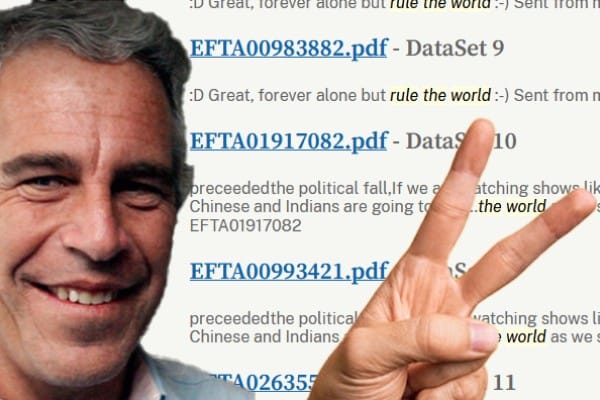🔒 How Geeks Ate the World
Defining geeks, how their relationship with masculinity formed a culture, and their culture formed an ideology.

How Geeks Ate the World is the working title of a book that I’m writing, exploring the development of reactionary movements in geek culture (media, tech, and hobbies) since the internet era, and how these movements have come to dominate real world politics in pretty horrifying ways.
I will be publishing chapters and essays related to this project for paying subscribers around once a month. Unlike my regular newsletter, these essays will remain paywalled.
👉 Episode 1 - How Geeks Ate the World
Episode 2 - Demons of Suspicion
Episode 3 - Backward Male
Episode 4 - The Californian Ideology
Episode 5 - Something Old, Something New, Something Rotten, Something Awful
Episode 6: The Bomb that Japan Dropped on America
As I write this the United States capitol is being sacked and burned by an army of teenage edgelords. They march under the banner of an internet meme from 2013, their mascot is a cartoon frog in Roman imperial armor, and they’re quite literally moving from door to door, commandeering systems, dismantling entire departments, terminating programs, and subjecting federal employees to humiliating rituals before summarily firing them, all at the direction of a game show host and a car salesman.
Freeze frame, record scratch. You’re probably wondering how we got here.
At the turn of the millennium, the United States was mumbling through the same ritual of business-as-usual politics that had been the standard for decades. It was the same predictable pendulum swing of American liberalism, usually eight years per swing between centre right and centre left (both of which are, you will often hear, slightly to the right of most of the rest of the western world).
There were fierce disagreements, but they played out before a backdrop of respected norms. Nobody suspected that these norms were running out their final few years. To most typical folk—the so-called “normies” (who are big fans of norms)—what was coming would arrive as a shock. But there was a boiling undercurrent playing out online that insisted on ending a tradition that had become stale and boring to them as they became further and further detached from it.
In 2016 the norms collapsed. A joke president, memed into the White House by an unseen collaboration of fringe cultures, each weak by themselves by strong when working together for a shared interest: The end of normality.
This is a story about geeks.
…which is a difficult word to define, and you probably equate it in your mind with something like “nerd,” but the distinction, believe it or not, matters. We need to start by taking some time to define “geek.”
For our very first stop let’s visit the Online Etymology Dictionary, which asserts the word might have Dutch and German origins as gek, geck, or gekken, meaning something like a fool.1 There is a generally accepted mythology that the modern usage of the word refers to carnival performers in the early 19th century who performed depraved acts like biting the heads off live animals. In any case, by the mid-19th century the word was gaining traction to refer to people who were considerably outside the bounds of what you would call normal society.2 Not quite a freak… but a geek.
The origin of the word “nerd” is much harder to track down but it is, in any case, much more recent. There are a dozen theories, one of the most often cited being that it’s of one of the imaginary creatures named in Dr Seuss’ If I Ran the Zoo (though this may be coincidental). Other theories range from it having begun as an acronym for something, or two words mashed together, or “drunk” spelled backward (knurd), or, what is evidently Simon Pegg’s favoured explanation, that it’s phonetic erosion—a compression of the phrase “ne’er-do-well.”3
So what are they, and what’s the difference? Scientist and software engineer Burr Settles actually tried to live up to his name and “settle” the issue (sorry) in 2013 when he collected a whole lot of data from Twitter and used word association stats to figure out the differences in the ways the two words are used. He admits that it’s not his best science, but I think it’s good enough to serve as a starter for us. The conclusion he came up with is that a nerd is:
A studious intellectual, although again of a particular topic or field. Nerds are “achievement” oriented, and focus their efforts on acquiring knowledge and skill over trivia and memorabilia.4
While a geek is:
An enthusiast of a particular topic or field. Geeks are “collection” oriented, gathering facts and mementos related to their subject of interest. They are obsessed with the newest, coolest, trendiest things that their subject has to offer.4
To the extent that there is a difference, for most people, “nerd” tends to invoke an intellectual connotation, whereas “geek” tends to invoke a pop culture connotation. In short, it’s the difference between being more into science or science fiction.
This is a story about geek culture.
Psychology professor David Anderegg, in his 2008 book Nerds: Who They Are and Why We Need More of Them, goes to great length teasing out the question of what nerds and geeks are and their role in society, with a particular emphasis on young children and their absorption of stereotypes.5 But one thing Anderegg oddly never addresses directly—though it feels like he had to go out of his way to avoid it—is how almost exclusively male these terms are.
That isn’t to say that there’s anything in the definition of geeks and nerds that precludes women or girls from being either of these things. It’s absurd to suggest it. Nevertheless, popular culture rarely touches on the concept of the “female nerd” except as either a novelty or the beginning of a character arc that ends with the character coming out of her shell and becoming beautiful. The “female geek” is rarer still, and often seems to present itself as something to be fetishized.
Environmentalist and tech entrepreneur Tara Tiger Brown caused a stir in 2012 when she penned an article for Forbes titled Dear Fake Geek Girls: Please Go Away, in which she illustrated her frustrations with being a real geek girl in a world awash with girls faking it for male attention.
When I was growing up being a geek wasn't something you wanted advertised but you felt pride in knowing that you were really good at something or were a subject matter expert on something obscure. I spent hours every night listening to Henry Rollins spoken word tapes when most people thought he was just in a band, I knew all the names of the Transformers characters and their backstories, I received all of my Girl Guides badges and I played every Sierra Online Quest game at least twice. I was not cool, I was a geek.6
But now…
Pretentious females who have labeled themselves as a "geek girl" figured out that guys will pay a lot of attention to them if they proclaim they are reading comics or playing video games. Celebrities are dressing up as geeks to reach a larger audience.6
Perhaps ironically, this led to accusations of gatekeeping within a group who were, as a whole, already being kept outside the gate of their greater culture. Associate Professor of Communication Studies Joseph Reagle notes that “nerd and geek identities have typically been understood as white and masculine,” and so “geeks and scholars have wrestled with the question of what it means to be a geek and atypical.”7
What is it, then, that makes girls and women the “other” in geek culture when there is nothing inherent to the definition that should exclude them? Although Anderegg doesn’t directly address the gender issue, he does make a point within his definition of geeks and nerds that, I think, cuts extremely close to the root of this issue:
Another way to understand nerds and geeks is to become aware of what nerds and geeks are not. There is a complementary stereotype that helps us define what nerds and geeks are, because it sums up what they lack: Nerds and geeks are, by definition, not jocks.5
Nerds and geeks are male-coded because their antithesis is male coded. “Jock” being somewhat of an antiquated term now, it has been since supplanted by words like “Chad.” Amusingly, when I searched for an appropriate definition of “Chad” for this book, Google’s auto-definition read “a piece of waste material removed from card or tape by punching.” Whether a Chad can be regarded waste material or how easily it can be removed by punching is a matter of some debate, but we will get to this later. For right now, as we explore the primordial origins of geek culture, we’ll work from first principles: Nerds and geeks, and jocks.
I’m going to be using the word “geek” in a specific way going forward that acknowledges its entanglement with the word “nerd.” A geek, for our purposes, is somewhat of an umbrella term that encompasses some aspects of what it means to be a nerd. If we reduce “nerd” to something like an antisocial or socially stunted brainiac, then there are ways in which that plugs easily into what we’re calling a geek, but for us a geek is something that has a much stronger cultural dimension to it.
And anything that is cultural is inevitably political.



